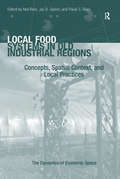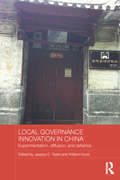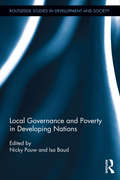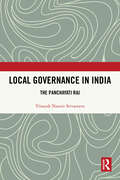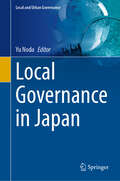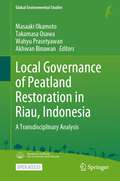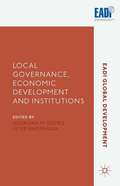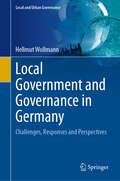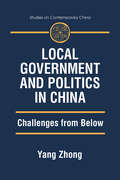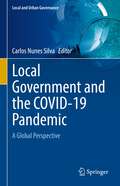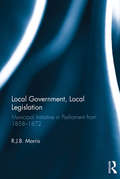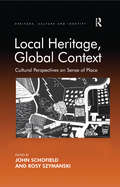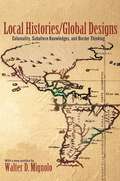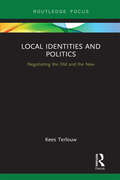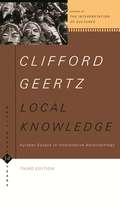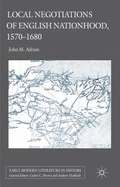- Table View
- List View
Local Food Systems in Old Industrial Regions: Concepts, Spatial Context, and Local Practices (The Dynamics of Economic Space)
by Jay D. Gatrell Paula S. RossIn recent years there has been an explosion of interest in local food systems-among policy makers, planners, and public health professionals, as well as environmentalists, community developers, academics, farmers, and ordinary citizens. While most local food systems share common characteristics, the chapters in this book explore the unique challenges and opportunities of local food systems located within mature and/or declining industrial regions. Local food systems have the potential to provide residents with a supply of safe and nutritious food; such systems also have the potential to create much-needed employment opportunities. However, challenges are numerous and include developing local markets of a sufficient scale, adequately matching supply and demand, and meeting the environmental challenges of finding safe growing locations. Interrogating the scale, scope, and economic context of local food systems in aging industrialized cities, this book provides a foundation for the development of new sub-fields in economic, urban, and agricultural geographies that focus on local food systems. The book represents a first attempt to provide a systematic picture of the opportunities and challenges facing the development of local food systems in old industrial regions.
Local Governance Innovation in China: Experimentation, Diffusion, and Defiance (Routledge Contemporary China Series)
by Jessica C. Teets William HurstDespite a centralized formal structure, Chinese politics and policy-making have long been marked by substantial degrees of regional and local variation and experimentation. These trends have, if anything, intensified as China’s reform matures. Though often remarked upon, the politicsof policy formation, diffusion, and implementation at the subnational level have not previously been comprehensively described, let alone satisfactorily explained. Based on extensive fieldwork, this book explores how policies diffuse across China today, the mechanisms through which local governments actually arrive at specific solutions, and the implications for China’s political development and stability in the years ahead. The chapters examine how local-level institutions solve governance challenges, such as rural development, enterprise reform, and social service provision. Focusing on diverse policy areas that include land use, state-owned enterprise reform, and house churches, the contributors all address the same overarching question: how do local policymakers innovate in each issue area to address a governance challenges and how, if at all, do these innovations diffuse into national politics. As a study of local governance in China today, this book will appeal to both students and scholars of Chinese politics, comparative politics, governance and development studies, and also to policy-makers interested in authoritarianism and governance.
Local Governance and Poverty in Developing Nations (Routledge Studies in Development and Society)
by Isa Baud Edited by Nicky PouwThis volume examines the persistence of poverty - both rural and urban - in developing countries, and the response of local governments to the problem, exploring the roles of governments, NGOs, and CSOs in national and sub-national agenda-setting, policy-making, and poverty-reduction strategies. It brings together a rich variety of in-depth country and international studies, based on a combination of original data-collection and extensive research experience in developing countries. Taking a bottom-up and multi-dimensional perspective of poverty and well-being as the starting point, the authors develop a convincing set of arguments for putting the priorities of poor people first on any development agenda, thus carving out an undisputable role for local governance in interplay with higher-up governance actors and institutions.
Local Governance in India: The Panchayati Raj
by Vinayak Narain SrivastavaLocal governance is a necessary condition for maturation of political and economic democracy. It undermines the vestiges of political authoritarianism and extends democracy to the grass roots. This book presents a study, analysis and an overview of local governance (Panchayati Raj) in India.Popular participation further leads to the emergence of a viable, dynamic, and healthy political culture, providing accessible channels of political articulation, making the institutions much more accountable and much less alienated and, therefore, much more legitimate. The volume, with its special focus on Uttar Pradesh, discusses crucial themes like self-government, political culture, and participatory politics; institutionalisation of local democracy and governance in post-colonial India; dynamics, functioning, and organisation of local governance; local industrialisation and finance; developmental intervention in Panchayati Raj; and local democracy and governance in a microcosm to showcase the potential of local governance as a holistic institution of democracy and development at local levels.This book will be an interesting read for academics and students of political science, public administration, public policy, governance studies, civil service, political sociology, development studies, policymakers, think tanks, non-governmental organisations and professionals working in the area.
Local Governance in Japan (Local and Urban Governance)
by Yu NodaLocal Governance in Japan is the first comprehensive exploration of local government in Japan, examining the sustainability of local governments operating with limited policy resources. This interdisciplinary study integrates insights from public administration, political science, economics, sociology, and business management. Japan has faced significant challenges in ensuring sustainability from rapid economic growth in the mid-20th century to the bubble's burst in the 1990s, and the population decline since 2008, along with large-scale natural disasters. Amid systemic changes—including a 46% reduction in local governments—local administrations have been developing effective cooperative relationships between local governments and exploring the significance of cooperation with citizens, NPOs, and the private sector. Characterized by extensive public facilities and infrastructure, Japan’s local governments provide a model for addressing future governance challenges. This book is essential for scholars, policymakers, and practitioners seeking innovative strategies to maintain public services and navigate the complexities of governance in a resource-constrained world.
Local Governance in Timor-Leste: Lessons in postcolonial state-building (Routledge Contemporary Southeast Asia Series)
by Deborah CumminsAcross many parts of the postcolonial world, it is everyday reality for people to cross regularly between state-based and customary governance, institutions and norms. This book examines this phenomenon in the context of the villages of Timor-Leste, and the state-building efforts that have been conducted by the Timorese government and international development agencies since the vote for independence in 1999. Drawing on 5 years of ethnographic fieldwork in the remote, rural areas of Timor-Leste, the book provides a critical analysis of the challenges that communities face when navigating coexisting customary and state-based structures and norms in a context where customary law continues to be the central guiding force. It also explores the various creative ways in which local leaders and community members make sense of their local governance environment. It then draws on these insights to provide a more nuanced, contextualised account of the impact of institutional interventions, state-building and democratisation within these villages. While set in the context of state- and nation-building efforts following Timor-Leste’s vote for independence, the book also provides a broader examination of the issues that arise for the postcolonial state adequately meeting the needs of its citizens. Further, it explores the challenges that are met by communities when incorporating state influences and demands into their everyday lives. Expanding the scope of empirical Timor-Leste scholarship by moving beyond anthropological description and providing the first detailed political analysis of local-level governance in contemporary Timorese communities, this book is a valuable contribution to studies on Asian Politics, Governance and International Studies.
Local Governance of Peatland Restoration in Riau, Indonesia: A Transdisciplinary Analysis (Global Environmental Studies)
by Masaaki Okamoto Takamasa Osawa Wahyu Prasetyawan Akhwan BinawanThis open access book is one in a series of four volumes introducing peatland conservation and restoration in Indonesia. It focuses on local governance, in particular on regional and local perspectives in Riau, the most peat-destructed province of Indonesia. The book fills a vital gap in the existing literature that overlooks social science and humanities perspectives. Written by authors from different disciplines and backgrounds (including scholars and NGO activists), the approaches to the topic are various and unique, including analysis of GPS logs, social media, geospatial assessments, online interviews (conducted due to the Covid-19 pandemic), and more conventional questionnaires and surveys of community members. The chapters cover an interdisciplinary understanding of peatland destruction and broadly offer insights into environmental governance. While presenting combined studies of established fieldwork methodologies and contemporary technology such as drones and geospatial information, the book also explores the potential of long-distance research with rural communities through online facilitation, which was brought about by Covid-19, but that may have longterm implications. Readers will gain a comprehensive understanding of the complexities surrounding peatland conservation and restoration and recognize the significance of locally inclusive approaches that use contemporary but accessible technologies to sustainably govern the globally important resource of peatland. That approach would be useful for other environmentally fragile but important regions and give some ideas to achieve the United Nations’ SDGs for 1)No Poverty, 5)Gender Equality, 13)Climate Action, 15)Life of Land.
Local Governance, Economic Development and Institutions (EADI Global Development Series)
by Peter Knorringa Georgina GómezLocal Government and Governance in Germany: Challenges, Responses and Perspectives (Local and Urban Governance)
by Hellmut WollmannThe book aims at outlining key political, functional, administrative and financial features of Germany’s local government system and at placing them in a (European) comparative perspective. In pursuing an “institutionalist” approach it focuses on discussing whether, how and why the position and activities of local government in the intergovernmental (“multi-level”) setting have changed vis-à-vis multiple challenges and crises. Among the latter tasks such as coping with the energy crisis, the influx of asylum seekers and refugees, the digitization of local administration and the Covid19 pandemic loom large. Ranking among the functionally and politically strongest among European countries Germany’s local government plays an important role in the German federal system and beyond in the European Union. Over the years it has proved a remarkable problem solving and innovative capacity. Hence, the German case may attract the attention of a European and international audience interested in local government and governance and practices.
Local Government and Politics in China: Challenges from below (Studies On Contemporary China Ser.)
by Yang ZhongAfter over a decade of administrative and economic reform in mainland China, the center has become increasingly remote and less important for many localities. In many ways, the mobilization capacity of the central government has been weakened. Central government policies are often ignored and local officials are often more interested in personal projects than in centrally directed economic plans. In this study of local government and politics in China, the author explores when and why local government officials comply with policy directives from above. Drawing on interviews with government officials in various municipalities and a review of county records and other government documents, he provides the first in-depth look at policy implementation at the county and township levels in the PRC. The book examines the impact of the Chinese cadre system on the behavior of local officials, local party and government structure, relationships among various levels of Chinese local government, policy supervision mechanisms at local levels, village governance of China, and more.
Local Government and the COVID-19 Pandemic: A Global Perspective (Local and Urban Governance)
by Carlos Nunes SilvaThe book provides a global perspective of local government response towards the COVID-19 pandemic through the analysis of a sample of countries in all continents. It examines the responses of local government, as well as the responses local government developed in articulation with other tiers of government and with civil society organizations, and explores the social, economic and policy impacts of the pandemic. The book offers an innovative contribution on the role of local government during the pandemic and discusses lessons for the future. The COVID-19 pandemic had a global impact on public health, in the well-being of citizens, in the economy, on civic life, in the provision of public services, and in the governance of cities and other human settlements, although in an uneven form across countries, cities and local communities. Cities and local governments have been acting decisively to apply the policy measures defined at national level to the specific local conditions. COVID-19 has exposed the inadequacy of the crisis response infrastructures and policies at both national and local levels in these countries as well as in many others across the world. But it also exposed much broader and deeper weaknesses that result from how societies are organized, namely the insecure life a substantial proportion of citizens have, as a result of economic and social policies followed in previous decades, which accentuated the impacts of the lockdown measures on employment, income, housing, among a myriad of other social dimensions. Besides the analysis of how governments, and local government, responded to the public health issues raised by the spread of the virus, the book deals also with the diversity of responses local governments have adopted and implemented in the countries, regions, cities and metropolitan areas. The analysis of these policy responses indicates that previously unthinkable policies can surprisingly be implemented at both national and local levels.
Local Government in Our Lives, Unit 7: Local Leaders
by Wright Group/McGraw-HillNIMAC-sourced textbook
Local Government, Local Legislation: Municipal Initiative in Parliament from 1858–1872
by R.J.B. MorrisIn the mid-Victorian period, when British international influence and power were at their height, concerns about local economic and social conditions were only slowly coming to be recognised as part of the obligations and expectations of central government. Adopting a legal history perspective, this study reveals how municipal authorities of this period had few public law powers to regulate local conditions, or to provide services, and thus the more enterprising went direct to Parliament to obtain – at a price – the passing specific local Bills to address their needs. Identifying and analysing for the first time the 335 local Parliamentary Bills promoted by local authorities in the period from the passing of the Local Government Act 1858 to the first annual report of the Local Government Board in 1872, the book draws three main conclusions from this huge mass of local statute book material. The first is that, far from being an uncoordinated mass of inconsistent, quixotic provisions, these Acts have a substantial degree of cohesion as a body of material. Second, the towns and cities of northern England secured more than half of them. Thirdly, the costs of promotions (and the vested interests involved in them) represented a huge and often wasteful outlay that a more pragmatic and forward-looking Parliamentary attitude could have greatly reduced.
Local Heritage, Global Context: Cultural Perspectives on Sense of Place (Heritage, Culture and Identity)
by Rosy Szymanski'Sense of place' has become a familiar phrase, used to describe emotional attachment to a particular location. As heritage management policy and practices increasingly attempt to draw on the views and expressions of interest amongst local communities, it is important to have a better grasp of what people mean by this concept, and to assess its uses and implications. Here, a range of practitioners from NGO, agency, cultural heritage and archaeological backgrounds review the meanings of 'sense of place', and where it is useful in the context of heritage management practice. This volume breaks new ground in specifically addressing place attachment from a cultural heritage perspective, and drawing on local and national interests from a diversity of cultural situations. Illustrated with case studies from around Europe and Australia, the book addresses key themes, including the rootedness amongst communities in the past; policy-making for accommodating senses of place within planning and management, for land- sea- and city-scapes; official versus unofficial views; and the often difficult balance between planning policies that extend from regional to global scale, and local actions and perceptions.
Local Histories/Global Designs: Coloniality, Subaltern Knowledges, and Border Thinking
by Walter D. MignoloThis book is an extended argument on the "coloniality" of power by one of the most innovative scholars of Latin American studies. In a shrinking world where sharp dichotomies, such as East/West and developing/developed, blur and shift, Walter Mignolo points to the inadequacy of current practice in the social sciences and area studies. He introduces the crucial notion of "colonial difference" into study of the modern colonial world. He also traces the emergence of new forms of knowledge, which he calls "border thinking."Further, he expands the horizons of those debates already under way in postcolonial studies of Asia and Africa by employing the terms and concerns of New World scholarship. His concept of "border gnosis," or what is known from the perspective of an empire's borderlands, counters the tendency of occidentalist perspectives to dominate, and thus limit, understanding.The book is divided into three parts: the first chapter deals with epistemology and postcoloniality; the next three chapters deal with the geopolitics of knowledge; the last three deal with the languages and cultures of scholarship. Here the author reintroduces the analysis of civilization from the perspective of globalization and argues that, rather than one "civilizing" process dominated by the West, the continually emerging subaltern voices break down the dichotomies characteristic of any cultural imperialism. By underscoring the fractures between globalization and mundializacion, Mignolo shows the locations of emerging border epistemologies, and of post-occidental reason.
Local Histories/Global Designs: Coloniality, Subaltern Knowledges, and Border Thinking (Princeton Studies in Culture/Power/History)
by Walter D. MignoloLocal Histories/Global Designs is an extended argument about the "coloniality" of power by one of the most innovative Latin American and Latino scholars. In a shrinking world where sharp dichotomies, such as East/West and developing/developed, blur and shift, Walter Mignolo points to the inadequacy of current practices in the social sciences and area studies. He explores the crucial notion of "colonial difference" in the study of the modern colonial world and traces the emergence of an epistemic shift, which he calls "border thinking." Further, he expands the horizons of those debates already under way in postcolonial studies of Asia and Africa by dwelling in the genealogy of thoughts of South/Central America, the Caribbean, and Latino/as in the United States. His concept of "border gnosis," or sensing and knowing by dwelling in imperial/colonial borderlands, counters the tendency of occidentalist perspectives to manage, and thus limit, understanding. In a new preface that discusses Local Histories/Global Designs as a dialogue with Hegel's Philosophy of History, Mignolo connects his argument with the unfolding of history in the first decade of the twenty-first century.
Local History and War Memories in Hokkaido (Routledge Studies in the Modern History of Asia)
by Philip A. SeatonHokkaido, the northernmost island of Japan, barely features in most histories of the Second World War. However, the combination of distinctive war experiences, a vibrant set of local historian groups, and powerful media organizations disseminating local war history, has generated an identifiable set of local collective memories. Hokkaidoʼs status as an early colonial acquisition also makes the island an important vantage point from which to reassess the course and nature of the Japanese Empire. This book argues that Hokkaido’s experiences of war and its militarized post-war constitutes a local case study with a much greater national and international significance on both theoretical and empirical grounds than first impressions might suggest. Using Japanese-language sources presented for the first time in English and a number of detailed local history case studies, it offers a fascinating and hitherto little-known perspective on the Second World War. It also combines a comprehensive theory of how war memories operate at the local level within a broad historical context that explains Hokkaidoʼs pivotal role within Japanese imperial history. Demonstrating that understanding local history and memories is essential for a nuanced understanding of national history and memories, the book will be highly valuable to students and scholars of Japanese history, Second World War history, and Asian history.
Local Identities and Politics: Negotiating the Old and the New
by Kees TerlouwThe relation between identity and space is strong and generates many conflicts. Most people attach great importance to their local community and its identity. The possibility of change can cause turmoil and become fertile ground for staking new identities. Understanding how these changes can take place is important to the future of community cohesion across the world. This book gives a detailed analysis of how different stakeholders in two Dutch municipalities use and adapt their identity discourses to deal with changing circumstances, situating this work within a wider international context through global comparisons. The growing spatial interdependence and political pressures for municipal cooperation or amalgamation creates not only threats, but also opportunities for stakeholders in local communities to transform their local identities. By studying how local communities attach to local identities, a new conceptual framework can be formed, informed by lively accounts from residents on the rich and varied use of identity in their communities and their concerns over future developments. This is valuable reading for students, scholars and researchers working in geography, politics, sociology and cultural studies.
Local Invisibility, Postcolonial Feminisms: Asian American Contemporary Artists In California (Critical Studies In Gender, Sexuality, And Culture Ser.)
by Laura FantoneThis book offers gendered, postcolonial insights into the poetic and artistic work of four generations of female Asian American artists in the San Francisco Bay Area. Nancy Hom, Betty Kano, Flo Oy Wong, Trinh T. Minh-ha, Theresa H.K. Cha, and Hung Liu are discussed in relation to the cultural politics of their time, and their art is examined in light of the question of what it means to be an Asian American artist. Laura Fantone’s exploration of this dynamic, understudied artistic community begets a sensitive and timely reflection on the state of Asian American women in the USA and in Californian cultural institutions.
Local Journalism and Local Media: Making the Local News
by Bob FranklinThe local media - local newspapers and radio, regional television, cable television and local news on the internet - represents a diverse and rapidly-changing sector of the British media landscape. Bringing together media academics, local journalists and other media professionals, this text presents a thorough, up-to-date and authoritative account of recent developments and future prospects for Britain's local newspapers, local media and local journalism. Drawing on current research and relevant literature, the book covers: *key developments in the local media scene*the distinctive editorial format of local newspapers*news sources and other sources available to local journalists*recent developments in media policy*online journalism*ethics and regulations*the impact of new technology. Situating the study within the context of local, national and multi-national media networks, this unique text provides students with a well-written and wide-ranging assessment of all aspects of the local media in the UK and as such, will be a welcome addition to the current literature.
Local Journalism: Critical Perspectives on the Provincial Newspaper
by Rachel Matthews and Guy HodgsonLocal Journalism investigates the range of meanings associated with the ‘local newspaper’ and considers how digital technology has disrupted the fabric of the local news industry. Divided into two parts, this book first provides a theoretical account of how normative meanings associated with the local newspaper have been challenged by the impact of digital technology and then goes on to explore these questions via case studies drawn from a variety of contexts including the US, Ireland, Denmark, the UK and Spain. It suggests three thematic ways of understanding the role of the legacy local newspaper in a post-digital environment, namely as an information provider, commercial entity and community champion. While much scholarship talks of their demise, this book argues for a more nuanced understanding of the local newspaper and its continued significance to people, places and commercial interests. Local Journalism will benefit students, academics and researchers in the areas of journalism, media studies and sociology.
Local Knowledge, Global Stage (Histories of Anthropology Annual)
by Regna Darnell Frederic W. GleachThe Histories of Anthropology Annual presents localized perspectives on the discipline’s history within a global context, with a goal of increasing awareness and use of historical approaches in teaching, learning, and conducting anthropology. This tenth volume of the series, Local Knowledge, Global Stage, examines worldwide historical trends of anthropology ranging from the assertion that all British anthropology is a study of the Old Testament to the discovery of the untranslated shorthand notes of pioneering anthropologist Franz Boas. Other topics include archival research into the study of Vancouver Island’s indigenous languages, explorations of the Christian notion of virgin births in Edwin Sidney Hartland’s The Legend of Perseus, and the Canadian government’s implementation of European-model farms as a way to undermine Native culture. In addition to Boas and Hartland, the essays explore the research and personalities of Susan Golla, Claude Lévi-Strauss, and others.
Local Knowledge: Further Essays in Interpretive Anthropology
by Clifford GeertzIn essays covering everything from art and common sense to charisma and constructions of the self, the eminent cultural anthropologist and author of The Interpretation of Cultures deepens our understanding of human societies through the intimacies of "local knowledge. " A companion volume to The Interpretation of Cultures, this book continues Geertz's exploration of the meaning of culture and the importance of shared cultural symbolism. With a new introduction by the author.
Local Lives: Migration and the Politics of Place (Studies in Migration and Diaspora)
by Brigitte Bonisch-BrednichLocal Lives contests dominant trends in migration theory, demonstrating that many migrant identities have not become entirely diasporic or cosmopolitan, but remain equally focused on emplaced belonging and the anxieties of being uprooted. By addressing the question of how migrants legally and symbolically lay claim to owning and belonging to place, it refocuses our attention on the micro-politics and everyday rituals of place-making, that are central to the construction of migrant identities. Exploring immigrants' interactions with house spaces, property rights, environmental conservation, landscape, historical knowledge of place, ideas of 'local community' and place-specific 'traditions', this volume shows how, in a fluid world of movement, locality remains a deeply contested and symbolically rich place to situate identity and to constitute the self. Thematically organised and presenting a diverse range of empirical studies dealing with migrant communities in Hawaii, Britain, France, Spain, Australia, New Zealand, the Dominican Republic and Albania, Local Lives reorients research in migration and transnational studies around locality. As such, it will appeal to social scientists working on questions relating to landscape, identity and belonging; race and ethnicity; and migration and transnationalism.
Local Negotiations of English Nationhood, 1570–1680
by John M. AdrianLocal Negotiations explores the vitality of early modern local consciousness. Even in an age of emerging nationhood, English men and women were still profoundly influenced by and even drew their primary identity from the parish, the town, and the county. This book examines how early modern writers invoke local places, traditions, and ways of thinking to respond to the larger political, religious, and cultural changes of the period. The opening chapter establishes the historical basis of local identity and describes the ways in which it was transformed in the second half of the sixteenth century. Each of the succeeding five chapters then focuses on a particular author and historical moment, and explores how local habits of thought are invoked to respond to a specific national initiative (political centralization, religious uniformity, court culture, civil war, and empire). Together, these chapters illustrate both the pervasiveness of local discourse and the range of possible responses to nationhood that it engendered. "
